Art of the Creative Entrepreneur, Part 1 of 2
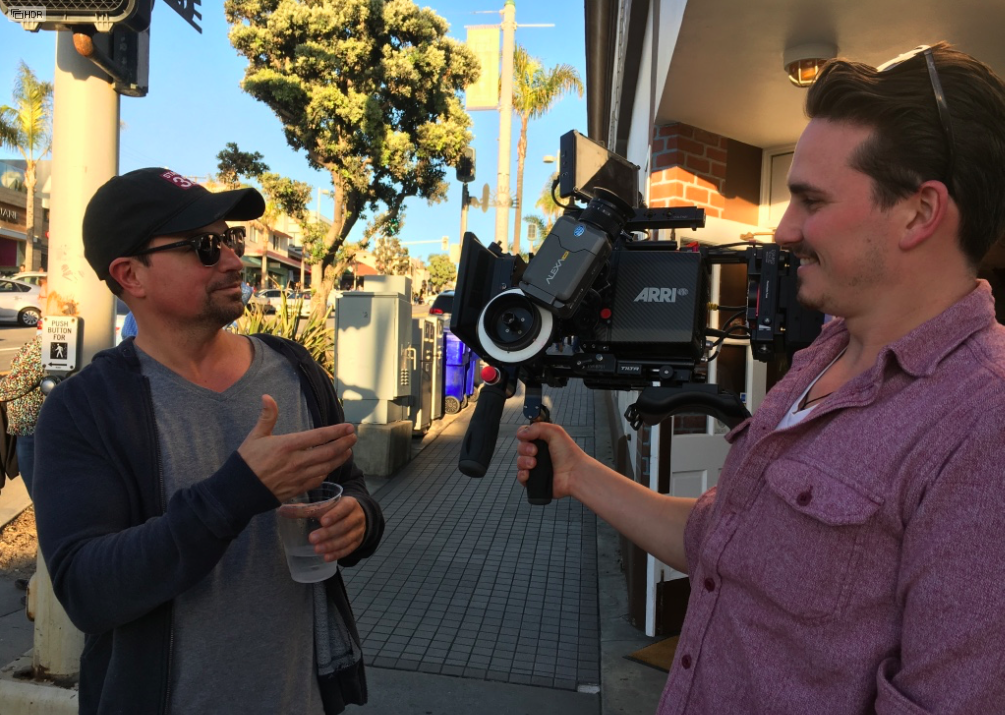
Michele Meek of NewEnglandFilm interviews RB (Richard Botto) of Stage 32 and author of Crowdsourcing for Filmmakers.
Do you think of yourself as an entrepreneur? Well, whether you know it or not, you probably are one.
Let’s put it this way: are you a filmmaker, producer, actor, writer, or short form content creator? Are you building a brand, generating clients and gigs, and producing work to earn your living. Guess what, you’re an entrepreneur. In that case, as RB (aka Richard Botto), the founder of Stage 32, would say, if you want to succeed, you’d better start thinking like one.
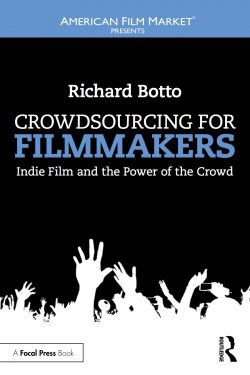
When I first met RB, I immediately liked him, perhaps because we’re fellow film entrepreneurs and paisans who still carry a touch of a New York accent and attitude. He’s got the swagger of an LA actor and producer, the straightforwardness of a New Yorker, and the introspection of a writer. But what struck me most about RB was how he competes without a sharp edge—he succeeds by emphasizing collaboration in both his business and creative pursuits.
In 2011, RB launched Stage 32, a site dedicated to fostering film and media networking opportunities, industry connections, and education. The site now has over 500,000 members ranging from students to Academy, Emmy and Tony Award winners, and the business has lent its educational expertise to partners including the American Film Market (AFM) and Cannes Film Festival.
In this two-part interview, RB and I talk about crowdsourcing (and, no, it’s not the same as crowdfunding), building your personal brand and persisting as an entrepreneur. In this first part, I interview RB about his entrepreneurial and creative ventures, including Stage 32 and his recent book Crowdsourcing for Filmmakers: Indie Film and the Power of the Crowd, and in the second part of this interview, we delve into my entrepreneurial journey with NewEnglandFilm.com.
Michele Meek: What motivated you to start Stage 32? I know this wasn’t your first entrepreneurial venture—can you talk about that transition?
Richard Botto: They always say that entrepreneurs go forward with certain ideas bred out of a need. And that with Stage 32 is definitely the case. I had just come out of running Razor, the magazine, and that was an incredible learning experience. It was a trial-by-fire experience because we were a single title publisher playing in a land of the Condé Nasts and the Hearsts, and we were so well received and we built such a great name for ourselves. But we were dealing with some really strong headwinds. Here we were—a print magazine in what was increasingly becoming a digital world, when everybody moved to the Internet. But the advertising world hadn’t caught up with that yet. So, we were actually ahead of the curve. We recognized the fact that there should be a digital component to this and we had it, but advertisers didn’t know what to do with it, so that was one problem.
And then second problem was even though we were being told by advertisers, ad buyers, and even people in the fashion world that we were dominating the male lifestyle category and how much they loved what we were doing, it was tough for them to make long term commitments. Even if they didn’t like let’s say what GQ or Esquire was doing at the time because they were buying across so many titles, they couldn’t drop one without getting the wrath of all. So, that left us sometimes in the outside looking in, even though they wanted to advertise with us.
So, as an entrepreneur, I had to say to myself, okay, our sales are going through the roof, our readership has never been higher and in our last ten issues that we’ve published, every single one of them outsold the previous one. But yet the lifeblood of any magazine is ad sales. And we’re struggling in that regard. So, as an entrepreneur I had to sit there and say to myself, okay how do you rectify that?
You’re creating such an amazing product but you’re a victim of the old guard and technology and people not understanding that technology. So, that when that was all said and done, it took a good year or two for me to shake off the pain of that. And during that time, I had started producing films, which, of course, is going from one difficult business into another. But I had met so many people through Razor in the industry. A couple of people lured me into some really high-level projects, and one of them ended up going to Sundance in 2011.
It was during that time where I had a desire to start writing screenplays. And what I recognized immediately in producing films and talking to writers is that relationships in this business matter a great deal. And it really is true that the relationship-building aspect of this business is underserved by a lot of people. They just think they have to create great material. That’s only half the battle.
So, I turned to social media and I looked at the Facebooks and the Twitters and the LinkedIns and everything like that. My mission was to only connect with people in the industry. The good part was I was getting a lot of connections. The bad part was all these connections were sharing pictures of babies and dogs and salads and actually nobody was talking about film.
So, I started thinking to myself a couple of things. One, if you’re a creative in any way, shape or form, to me you are an entrepreneur. You’re really the feel of you and your brand. And the second thing is that at some point there is going to be a saturation of broad based social media. But social media is important, so where is it going to go? It’s going to go towards niche-based social media. And I believed that one for people working in film and television and for content creators would catch on. So, that’s where the idea came from.
And it took me about two years to convince myself to do it. But, I finally did because working on some of these films I absolutely saw the need. I was talking to a lot of people who were working on these movies. And without connections, they don’t know where the next job is coming from. They think, I need more people in my network. So, all of those things convinced me to finally go forward and do it.
MM: So did Stage32 come out of a need that you, yourself felt like you personally had, or did you feel like it was more of a need that you felt others had or both?
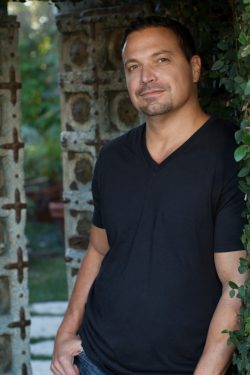
RB: I think both. I mean for me, I did recognize early on the importance of those relationships as a way to moving forward in this business. You know, the idea of what eventually became crowdsourcing—winning champions of you, your projects, and your brand —really early on was something that stuck out to me because I would be at events and I would hear somebody saying, I’m looking for a cinematographer, and it’s so tough to find. And somebody else would say, you have to work with this guy, he’s looking for work right now. And if that was a trusted voice, then that voice carried a lot of weight. And that’s the idea of crowdsourcing and being out there and building relationships.
With other people, I saw it when I was working on an independent film in Michigan. At the time the Michigan tax breaks were so huge that everybody was filming in Michigan. It was a low budget indie that went to Sundance, and the crew was local and the cast was mostly from LA. So, every night everybody would hang out, and it was like summer camp. And, we forged these relationships over a month. We felt we’re always going to be together, and when we go home we’ll send each other letters. But then you go home, and nobody hears from anybody.
Then the tax incentives dried up in Michigan, and now, all of a sudden, all the work went away. Now they’re not only looking for jobs, but they’re looking to move. So, a lot of them came to me saying, I want to move to LA, but I don’t know anybody—can you recommend me to people? And I realized, how does a guy contemplating this move to LA in six months spend the next six months from the comfort of his own home making connections that matter?
MM: What’s the feedback that you’re getting from people on how Stage 32 is helping them forge those types of connections?
RB: There’s actually two answers to that question. For the people who are actually putting in the time and for the people who are treating their careers as if they are the CEO of their brands, their careers—those people are not only overwhelmingly supportive, but they’ve been the most successful people on the site. These are the people who are finding jobs constantly, landing management, finding financing for films, producing films, connecting with people that end up being their tribe. These are filmmakers who have found their whole cast and crew, and they go back to the well with these people time and time again through connecting on Stage 32.
The people that don’t put in the time—they’ll sit there and they say well, I’m not really getting anything out of the network. And then you go and you look at their activity, and they haven’t done anything. And that’s typical—you get out what you put in. But, you know, it’s been overwhelmingly positive and rewarding.
Meek: Can you talk about how you have come to represent the brand of Stage 32 in some way?
RB: We made the decision very early on that I was going to stand out in front of the brand. And, in a way, that made it very clear that I am no different than anyone else on the platform. I’m not just a business guy that came up with an idea. I’m an actor, a producer, a screenwriter. And I’m scratching, clawing, just like everybody else.
If you’re an entrepreneur, as you very well know—no guts no glory, right? You’ve got to put yourself on the line sometimes, and make decisions that are extremely risky.
Meek: Launching a business feels like a risk in itself…
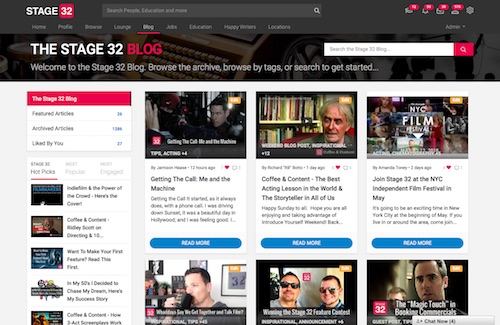
RB: My big risk moment, if you want to call it that, was to invest the money in building the first phase of Stage 32 before asking anybody if they thought they would use it. And the reason I did it that way was because I knew immediately if I said hey I’m starting a social network for film creators and content creators what I was going to hear was, why do I need another social network?
So, I said okay, I’m going to create this thing. And then I made a list of 100 people who I knew in the business from all walks—actors, producers, financiers—but people that I knew who I felt would respond to me. And I wrote them a very heartfelt letter. I explained that the reason that I’m doing this is because I not only want to connect creatives worldwide and give them a place where they can spend their networking and relationship-building time wisely and productively. But I want to have a community where everybody has to stand out in front of their own name, unlike a lot of other social platforms, so that we can create a positive, supportive, and inspiring community as well. A safe haven for people to come because what space they create is the lifeblood of any creative support. And a lot of people that live around the world don’t have that. If you live in New York or L.A., you can find an acting group, a writing group and everything like that. If you live remotely, it’s not as easy. So, we wanted to give people a place, to say look I think I have the talent, and I think I can get this done
In the second part of the letter, I emphasized that I invested my own money to build the site, and said please give me the respect to just check it out. And then the third thing I said is here’s my only ask from you: If you like what you see, what I’d like you to do is invite at least five fellow creative, help me build the platform because this is a platform for you, built by you.
And for a month and a half, I chased everybody down and eventually I got all one hundred to respond. Ninety-seven of them signed up, and they started inviting other people, and within three months we had 5,000 people on the site. And now we are over half million strong because you still get that exact message. If you sign up for Stage 32 today, you get that exact message from me on your wall basically saying look, I’m just like you scratching and clawing.
No matter how successful you are in this business you’ll always be scratching and clawing, because you’re only as good as your last project. And we’re going to do this together. So, if you like what you see, invite at least five others. And so, when I say we have over a half million people, none of it comes from advertising, it all comes from word-of-mouth and from people sending those invites because they’re part of what we’re doing. They’re those boots on the ground that we always talk about when we talk about crowdsourcing.
Meek: Speaking of which, what inspired you to write your book Crowdsourcing for Filmmakers: Indie Film and the Power of the Crowd? Is this the first book you’ve written?
RB: Sure, besides the novel I wrote at 21 and stuck in a drawer, and is still in the drawer.
Meek: (laughs) That counts.
RB: Doesn’t everyone have one of those?
Anyway, when I went out to those hundred people and said, invite five other people, I didn’t, nobody really knew the word crowdsourcing.
Meek: Right.
RB: But that’s what we were doing. We were asking people to be champions of us and our cause and our mission and to carry that mission to people who would trust their voice about it. And so, a few years back I was asked to moderate a program panel for crowdsourcing for all film creatives—for producers, film financiers, and talent.
So, we put on this panel, and it was extremely well received. Although at first we let everyone know that crowdsourcing is not crowdfunding because there was definitely confusion. I think there was disappointment for the crowd, but the happy news is that there is an element of crowdsourcing to every successful crowdfunding campaign. So, you have to understand crowdsourcing to be able to run a successful crowdfunding campaign. So after that an editor from Routledge approached me and said, we’d love to have you write a book on this. And I was like we barely gave an hour and a half talk, you know?
Meek: (laughs)
RB: She’s like nope, let’s go talk about it. So, we sat down and we talked. And I thanked her for her time, and I told her no. But she kept coming to me and saying, come on let’s do it. And what I realized during that time was that there were so many people on Stage 32 and other social media channels who write me and say, I don’t understand it. They say, I’ve been working on it and I only have three followers on Twitter, and nobody cares. And I realized there really is a need for this. And so finally I just decided to do it.
I conducted about a hundred interviews with people who had used crowdsourcing for a variety of reasons either as part of a crowdfunding campaign or to crowdsource locations, crowdsource character names, crowdsource plot points in their script, crowdsource equipment, I mean you name it. And I found the stories just so fascinating that, I finally was fully committed to doing it and dove in.
It was eye opening in a lot of ways because you got to see the spirit of a true entrepreneur. A lot of these producers and filmmakers and writers really took it upon themselves to figure out the business end of this thing and how to win those champions. There are three great case studies in the book—a short, a feature, and a feature documentary.
A lot of people feel it’s daunting to see all the content that’s being created and say, I know my stuff is good, but how is it going to stand out? Who’s going to watch it? And that’s what you need to be thinking about six months before you ever go into pre-production, you know. But a lot of people don’t. But those that do, win the day. And that’s what this book is intended to help people do.
It’s all about identifying, engaging, and moving an audience with the brand of your film or the brand of your projects or the brand of anything. So, really any business person or any entrepreneur could read it and get something out of it even though it’s film related.
Meek: You have a section on Stage 32 called The Happy Writers where you’re offering script coverage and other services for writers. Plus you’re doing online workshops and classes. Can you talk about that?
RB: You know when I started writing, I looked for some classes online to help me with a rewrite of my first script. And I found a guy who had claimed to have worked for 20th Century Fox and Warner Brothers and a whole bunch of other studios. And I’m like, god, you know, I’ve never heard of this guy, I don’t see any credits. So, I started Googling, and this genius had not changed his LinkedIn profile, and he was, and this is no lie, he was an insurance adjustor from Lincoln, Nebraska. And I said, you’ve got to be fucking kidding me. So, that pissed me off because at the time—and it’s more true than ever today—more content was getting purchased, so more and more writers are coming into the pool saying, I can do that. And, with that came more people who want to bilk them out of their money.
So, I decided early on also that the second phase of Stage 32 or the second mission was to provide education access and opportunity for all no matter what craft you work in or what you were pursuing within the business. And so, we spent about two years networking and connecting with executives all over the world and finding people in development, finding great writing teachers, finding literary managers, financiers, everybody that we could find who worked in distribution who, when the time came, would be available and ready to either teach or mentor or provide coverage services.
And when we hit about 200,000 people in the community, that’s when we launched our education and that’s when we launched our writer services as well. And the whole goal is to make sure that we are providing timely and actionable education.
So, for our coverage services, for example, we work directly with working executives in the industry. It’s completely transparent. You get to go in, look at, and pick who covers your script in what genre you’re writing. You know that’ll be their specialty, and you have the opportunity to even get on a consulting phone call with them.
So, that’s the access—it’s direct. And, direct access in this business is gold. It’s everything.
Meek: How will you know when you’ve “made it”?
RB: Oh god, in what, in what respect?
Meek: (laughs) What keeps you motivated? What are you working towards? Do you have a fixed goal in mind or you sort of more on the journey?
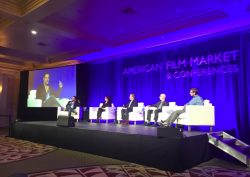
RB: It’s a great question. I have so many lines in the water, you know, there’s Stage 32 and then there’s all my creative pursuits, other business interests as well. I’m still writing. I’m still producing. I have a film that’s in development right now that’s being financed by Covert Media and and packaged and cast by CAA, and that’s something to be excited about. And there’s another script that’s being pushed around, and three things I’m producing that are in various stages of development. It’s always inspiring to be around people that are doing it, and I think that’s again part of the mission of the site to begin with.
But I mean, to be where we are six years as a brand for Stage 32 and to be recognized by so many established brands within the industry and to have so many people perusing us for a variety of different initiatives and partnerships—that’s really rewarding as well.
You know, I think it is a little bit of being on the journey. We know where we want to go, but we also know that this business changes so rapidly. We just want to be at the forefront of all of it and make sure we’re working with the people who are at the forefront of all of it. And we feel if we do that then a lot of the rest will take care of itself.
